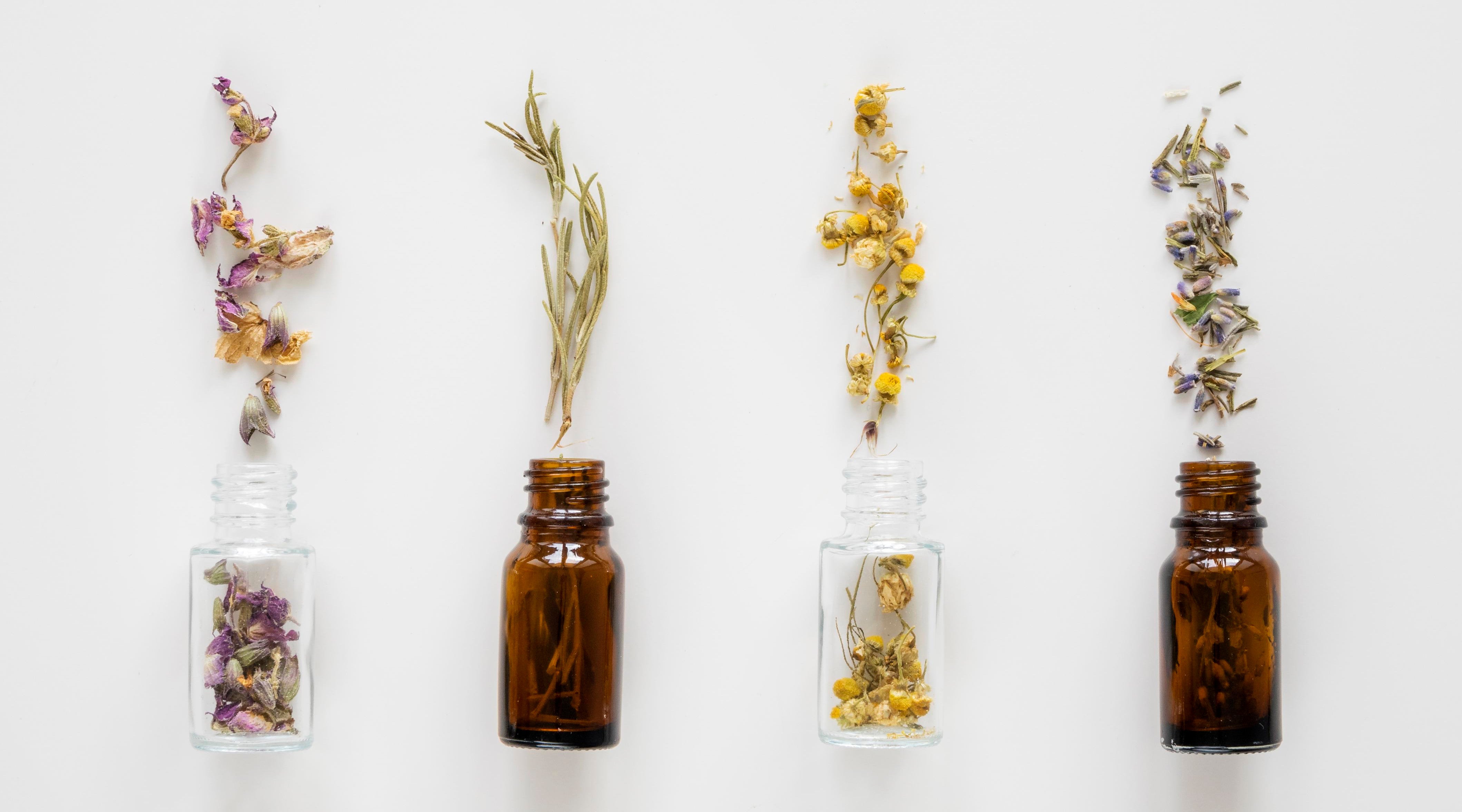
In This Article
In recent years, the skincare industry has witnessed a remarkable shift towards natural and holistic approaches to beauty, with essential oils playing a big role.
These aromatic extracts, derived from plant sources, have rapidly become popular in skincare products, offering a natural alternative to artificial fragrances and synthetics for those seeking healthier, more sustainable options.
But what exactly are essential oils, and how do they work their magic on our skin?
In this post, we will reveal the secrets behind essential oils, from their extraction methods to the diverse therapeutic benefits they bring.
Whether you're dealing with acne, dryness, or sensitivity, we'll explore the essential oils best suited to your unique skin type, helping you harness the full potential of nature's healing power for a healthier, more radiant you.
Why are essential oils popular in skincare?
The popularity of essential oils in skincare can be attributed to the global shift towards natural, clean products that have encouraged people to explore safer alternatives for their skincare.
Essential oils are derived from plant sources and contain no synthetic chemicals, making them a good choice for those seeking healthier, more sustainable options.
Additionally, essential oils play a pivotal role in promoting skin health. Many essential oils, such as clove, tea tree, and chamomile, possess anti-inflammatory, antibacterial, and antioxidant properties. These qualities make essential oils effective in treating acne, soothing skin irritations, and rejuvenating the skin.
What exactly are essential oils, and how are they extracted?
Essential oils are volatile, hydrophobic liquids that carry the distinctive fragrance and therapeutic benefits of the plant they're derived from. There are several methods for extracting essential oils, with the most common ones being steam distillation, cold-press extraction, and solvent extraction.
- Steam Distillation: This is the most widely used method, especially for extracting essential oils from aromatic plants like lavender or eucalyptus. It involves passing steam through the plant material, which causes the essential oil to vaporize. The vapor is then condensed into liquid form, resulting in the essential oil.
- Cold-Press Extraction: This method is employed for citrus fruits like oranges and lemons. It involves mechanically pressing the oils from the peel to capture the fragrant oil.
- Solvent Extraction: This method is reserved for delicate flowers like jasmine and rose. A solvent, usually hexane, is used to dissolve the essential oil, which is later separated from the solvent.
There are countless essential oils, each with its own unique scent and therapeutic properties.
Popular examples include lavender for relaxation, tea tree for its antimicrobial properties, and peppermint for its invigorating scent. Whether you seek calm, focus, or healing, there's an essential oil to match your needs.
Essential oils Vs. Carrier Oils
It's important to differentiate between essential oils and carrier oils.
Essential oils are highly concentrated and need to be diluted with a carrier oil before applying them to the skin.
Carrier oils, like coconut, jojoba, or almond oil, have less intense fragrances and serve as a base for dilution, ensuring safe and effective use of essential oils.
While essential oils provide fragrance and therapeutic benefits, carrier oils act as a buffer, facilitating proper application and absorption. Understanding this distinction is key to the safe and effective use of essential oils.
What makes essential oils effective for skincare?
Essential oils are a treasure trove of bioactive chemical compounds, each contributing to their skincare efficacy.
Terpenes, alcohols, esters, and phenols are just a few examples of the diverse components found in essential oils. These compounds bring an array of benefits, from antibacterial and anti-inflammatory properties to antioxidant and regenerative effects.
For instance, the terpene-rich tea tree oil is celebrated for its antibacterial properties, making it effective against acne, while the esters in lavender oil help calm and soothe irritated skin.
The skin, our largest organ, is more than just a barrier; it's an active interface that can absorb and respond to the compounds in essential oils.
Essential oils penetrate the skin's topmost layer, the epidermis, and interact with underlying tissues. They can promote circulation, balance sebum production, and aid in the regeneration of skin cells.
Moreover, the olfactory aspect of essential oils can have a psychological impact, promoting relaxation or energizing the mind, which can indirectly improve skin health by reducing stress-related issues.
Different skin types have unique needs, and essential oils cater to a wide range of concerns.
Oily and acne-prone skin often benefits from essential oils like tea tree, lavender, and rosemary, which help regulate sebum production and combat blemishes.
Dry skin types find comfort in moisturizing oils like geranium and coconut.
Sensitive skin can be soothed by chamomile or calendula essential oils due to their anti-inflammatory properties.
Which essential oils are right for your skin?
Oils for Aging Skin: Hydrating and Nourishing Options
- Grapefruit Oil: Rich in vitamin C it calms and soothes, promotes collagen production, and brightens dark spots.
- Neem Seed Oil: With its rich content of antioxidants and essential fatty acids, it helps combat free radical damage and maintain skin's elasticity, reducing the appearance of fine lines and wrinkles.
- Geranium Oil: Excellent for aging skin due to its astringent properties, which help tighten and tone the skin, reducing the appearance of fine lines and wrinkles. Additionally, it encourages improved blood circulation, promoting a more youthful and radiant complexion.
Oils for Oily/Acne-Prone Skin: Balancing and Clarifying Choices
- Tea Tree Oil: Renowned for its antibacterial properties, tea tree oil effectively combats acne and excess sebum production while soothing inflammation.
- Camphor Oil: Known for its antibacterial properties it effectively combats acne, sooths and calms irritated skin, and helps remove dead cells.
- Geranium Oil: This oil regulates sebum secretion, tightens pores, and reduces blemishes, making it a valuable addition to your skincare routine.
Oils for Sensitive Skin: Soothing and Gentle Selections
- Chamomile Oil: Exceptionally gentle and anti-inflammatory, making it ideal for soothing redness and irritation in sensitive skin.
- Calendula Oil: Known for its skin-calming properties and helps reduce sensitivity while promoting healing for sensitive skin.
- Jojoba Oil: Although technically a liquid wax, jojoba oil closely resembles the skin's natural sebum. It provides gentle hydration and balance to sensitive skin.
At FP Skin we have wholeheartedly embraced this natural revolution since our inception. Our carefully crafted skincare products are formulated with the highest quality essential oils, each selected for its unique therapeutic properties. Whether you're seeking the age-defying benefits of rosehip oil, the soothing relief of chamomile for sensitive skin, or the clarifying power of tea tree oil for acne-prone skin, our products are designed to elevate your skincare routine to new heights. We think that your skin is precious, and our commitment to using natural, pure, and sustainably sourced essential oils ensures that you can enjoy the full potential of nature's bounty.
Disclaimer: Content found on www.fpskin.com, including text, images, audio, or other formats was created for informational purposes only. The Content is not a substitute for professional medical advice, diagnosis, or treatment. Always seek the advice of your physician or another qualified health provider with any questions you may have regarding a medical condition. Never disregard professional medical advice or delay in seeking it because of something you have read on this website or blog.

Comments (0)
Back to Blog